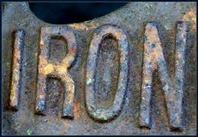These can be common in newbie Coeliacs (2 yrs CD (and women for obvious reasons).
Don't just put up with feeling crappy. Often friends and family will get used to you feeling unwell. Write down your energy levels at different times and compare them with other people you know in similar circumstances. Does it seem that your problems seem to be reinforced by no-one else having the same probs in the same situations? Then read below and book an appt with your GP to get it checked.
Lots of the vitamin deficiencies that Coeliacs are prone to due to stomach problems are similar eg vit D, B12, Iron etc. So it's always worth seeking medical advice to get blood tests. We all deserve to feel better - despite having CD. Don't just assume feeling ill is CD or old age. It may well be something different or simple to deal with.
Been GF a while and still feeling crappy?
Despite this being listed on Wikipedia these are common symptoms of iron deficiency. So they're worth looking up and seeing a doc about. It could be something that can be solved simply.
Symptoms and Signs
Iron deficiency anemia is characterized by pallor (reduced amount of oxyhemoglobin in skin or mucous membrane), fatigue and weakness. Because it tends to develop slowly, adaptation occurs and the disease often goes unrecognized for some time. In severe cases, dyspnea (trouble breathing) can occur. Unusual obsessive food cravings, known as pica, may develop. Pagophagia or pica for ice is a very specific symptom and may disappear with correction of iron deficiency anemia. Hair loss and lightheadedness can also be associated with iron deficiency anemia.
"Other symptoms and signs of iron deficiency anemia include:
* Constipation
* Sleepiness
* Tinnitus
* Palpitations
* Hair loss
* Fainting or feeling faint
* Depression
* Breathlessness on exertion.
* Twitching muscles
* Tingling, numbness, or burning sensations
* Missed menstrual cycle
* Heavy menstrual period
* Slow social development
* Glossitis (inflammation or infection of the tongue)
* Angular cheilitis (inflammatory lesions at the mouth's corners)
* Koilonychia (spoon-shaped nails) or nails that are weak or brittle
* Poor appetite
* Pruritus (Itchiness)
* Dysphagia due to formation of esophageal webs (Plummer-vinson syndrome).
* Angular stomatitis"
Note: Vitamin D, Vitamin A and B12 deficiencies can display similar symptoms.
See also:
patient.co.uk/health/Iron-D...
How is iron deficiency anaemia diagnosed?
A blood test can confirm that you are anaemic. A test called the full blood count (FBC) is the main test. For this test the blood sample is put into a machine which automatically:
* Counts the number of red cells, white cells, and platelets per ml of blood.
* Measures the size of the red blood cells and calculates their average (mean) size.
* Calculates the proportion of blood made up from red blood cells (the haematocrit).
* Measures the amount of haemoglobin in the red blood cells.
This test can determine if you are anaemic, and often gives a good idea as to the cause of anaemia. But, as there are many different causes of anaemia, there may be some doubt as to the cause of the anaemia.
Symptoms of iron-deficiency anaemia
The symptoms of iron-deficiency anaemia include:
* feeling breathless after little exercise
* feeling tired
* palpitations (the sensation of feeling the heartbeat thumping in the chest)
* looking pale
* a rapid pulse
Less common symptoms can include:
* tinnitus (ringing in your ears)
* an altered sense of taste
* brittle nails or 'spoon nails' where the middles of your nails are pushed inwards and the edges are raised
* soreness at the edges of your mouth
* a short attention span and poor concentration
These symptoms aren't always due to iron-deficiency anaemia but if you have them, see your GP.
